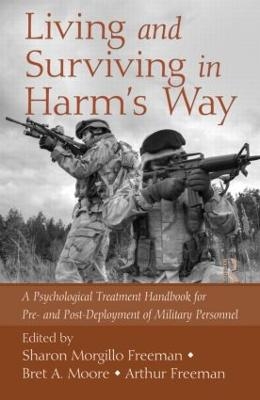
Living and Surviving in Harm's Way
Routledge (Verlag)
978-0-415-98868-1 (ISBN)
In Living and Surviving in Harm's Way, experts investigate the psychological impact of how warriors live and survive in combat duty. They address the combat preparation of servicemen and women, their support systems, and their interpersonal and intrapersonal experiences. The text maintains a focus on cognitive-behavioral interventions for treating various combat-related disorders, and addresses psychological health and adjustment after leaving the battlefield. The text is logically organized for easy reading and reference, and covers often overlooked topics such as preparation and training of service personnel, women in combat, and the indirect effects of combat stress on family. This book is written by clinicians who have in some ways experienced what they write about, and resonates with mental health professionals, servicemen and women, and their families. Any clinician hoping to treat a serviceman or woman effectively cannot afford to overlook this book.
Sharon Morgillo Freeman, serves as CEO of The Freeman International Institute and The Center for Brief Therapy, PC, in Fort Wayne, Indiana and Professor, Health Sciences Department at Indiana/Purdue University in Fort Wayne, Indiana. Captain Bret Moore, PsyD, ABPP, is a clinical psychologist with Indian Health Service in Poplar, Montana and former Captain and clinical psychologist in the U.S. Army. Dr. Moore served two tours in Iraq providing psychological services to military personnel. Arthur Freeman, EdD, ABPP, is visiting professor of psychology at Governors State University, and clinical professor at Philadelphia College of Osteopathic Medicine.
Beck, Foreword. Freeman, Freeman, Moore, Introduction. Understanding the Service Member. Matthews, The Soldier's Mind: Motivation, Mindset, and Attitude. Stivers, Sammons, Training for Battle: Preparing to be the Warrior and Savior. Reger, Moore, Challenges and Threats of Deployment. Kennedy, Malone, Integration of Women into the Modern Military. On Being a Service Member. Kelly, Vogt, Military Stress: Effects of Acute, Chronic, and Traumatic Stress on Mental and Physical Health. Freeman, Freeman, Vulnerability Factors: Raising and Lowering the Threshold for Response. Conoscenti, Vine, Papa, Litz, Scanning for Danger: Readjustment to the Non-combat Environment. Freeman, Freeman, Assessment and Evaluation: Collecting the Requisite Building Blocks for Treatment Planning. The Individual Service Member: Intervention. Freeman, Moore, Theoretical Base for Treatment of Military Personnel. Meichenbaum, Core Psychotherapeutic Tasks with Returning Soldiers: A Case Conceptualization Approach. Riggs, Treatment of Anxiety Disorders. Rudd, Campise, Depression and Suicide: A Diathesis-stress Model for Understanding and Treatment. Freeman, Hurst, Susbstance Use, Misuse, and Abuse: Impaired Problem Solving and Coping. Moore, Krakow, Characteristics, Effects, and Treatment of Sleep Disorders in Service Members. Moore, Hopewell, Grossman, After the Battle: Violence and the Warrior. Freeman, Lundt, Swanton, Moore, Myths and Realities of Pharmacotherapy in the Military. The Service Member's Family and Community: Intervention. Mabe, War and Children Coping with Parental Deployment. Lyons, Intimate Relationships and the Military. Cohen, Goodman, Campbell, Carroll, Campagna, Military Children: The Sometimes Orphans of War. Penk, Ainspan, Community Response to Returning Military. Drescher, Burgoyne, Casas, Lovato, Curran, Pivar, Foy, Issues of Grief, Loss, Honor, and Rememberance: Spirituality and Work with Military Personnel and their Families. Peterson, Cigrang, Isler, Future Directions: Trauma, Resilience and Recovery Research.
| Erscheint lt. Verlag | 29.6.2009 |
|---|---|
| Zusatzinfo | 12 Tables, black and white; 15 Illustrations, black and white |
| Verlagsort | London |
| Sprache | englisch |
| Maße | 156 x 234 mm |
| Gewicht | 1170 g |
| Themenwelt | Sozialwissenschaften ► Politik / Verwaltung |
| ISBN-10 | 0-415-98868-3 / 0415988683 |
| ISBN-13 | 978-0-415-98868-1 / 9780415988681 |
| Zustand | Neuware |
| Haben Sie eine Frage zum Produkt? |
aus dem Bereich


